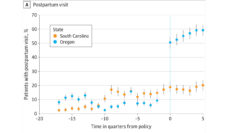Childbirth is an incredible journey that demonstrates immense power and determination. Unfortunately, there are barriers when giving birth in the United States regarding insurance status and quality of birthing care.
What does insurance status have to do with childbirth? First, pregnant recipients of Medicaid are typically at higher risk for poor outcomes than those with private health insurance. Second, women who are uninsured have less prenatal care and a more difficult time receiving necessary care during pregnancy than those who are insured. Birthing centers and the Strong Start Initiative seek to improve birth outcomes and provide quality care regardless of income or health insurance (or lack thereof).
The birth center model of care is a health care delivery innovation in its fourth year in the United States. It promotes the wellbeing of mothers and babies by providing personalized and holistic care, valuing birthing preferences, and promoting dignity and equality. Birthing centers are freestanding facilities separate from hospital settings, and midwives provide primary care.
The Strong Start for Mothers and Newborns Initiative (Strong Start) is a joint effort between the Centers for Medicare and Medicaid Services, the Health Resources and Services Administration, and the Administration on Children and Families. Between 2013 and 2017, 26,259 childbearing people received care within 45 Strong Start birth center sites.
My colleagues and I evaluated the birth center model of care and Strong Start to better understand the potential for decreasing poverty-related health disparities for families. We investigated Medicaid and privately insured individuals enrolled with Strong Start birth centers between 2013 and 2017. Examples of private insurance include Cigna, United Health Care, and Blue Cross Blue Shield. The social and demographic factors we examined included years of education, age, number of children, marital status, and race and ethnicity. Our populations of interest were privately insured, Strong Start-enrolled Medicaid beneficiaries, and Medicaid beneficiaries not enrolled in Strong Start. The medical factors included premature birth, bleeding after birth, breastfeeding after birth, and individuals that needed their labor induced.
Ensuring that a family and baby’s journey together starts with the best possible care regardless of income, race, or insurance status is essential for their future and all future childbirths.
Our analysis found that privately insured individuals had higher levels of education (broken down into less than college, college, or higher than college categories), fewer previous births, and were less likely to be White compared to Strong Start enrollees and Medicaid beneficiaries. Strong Start and Medicaid beneficiaries had higher rates of low birth weight than privately insured people but had less neonatal intensive care unit admissions. Compared to typical hospital care, birth center care resulted in decreased rates of premature birth, low birthweight, and Cesarean birth, demonstrating the importance of the Strong Start Initiative and birthing centers for the goal of equality in birthing care.
National standards for care are important for measuring and tracking the quality of care provided to childbearing families. Our results show that national standards of care were exceeded and beneficial results from birth center-led care continue regardless of insurance types and suggest lessening poverty-related health disparities. Midwifery-led birth center care has previously been shown to be desirable for a range of people with a variety of characteristics. The lack of use of the intervention relates to lack of access, not lack of preference.
Our findings advance the current science on midwifery-led care, facilitate further research informing clinical practice, and expand research into potential disparities regarding racial, social, and insurance statuses during the birthing process. Studies like this are essential for highlighting the need for access to quality care, and birthing persons deserve to remain informed on practices that will benefit them the best during and after their pregnancy. Ensuring that a family and baby’s journey together starts with the best possible care regardless of income, race, or insurance status is essential for their future and all future childbirths.
Photo via Getty Images














